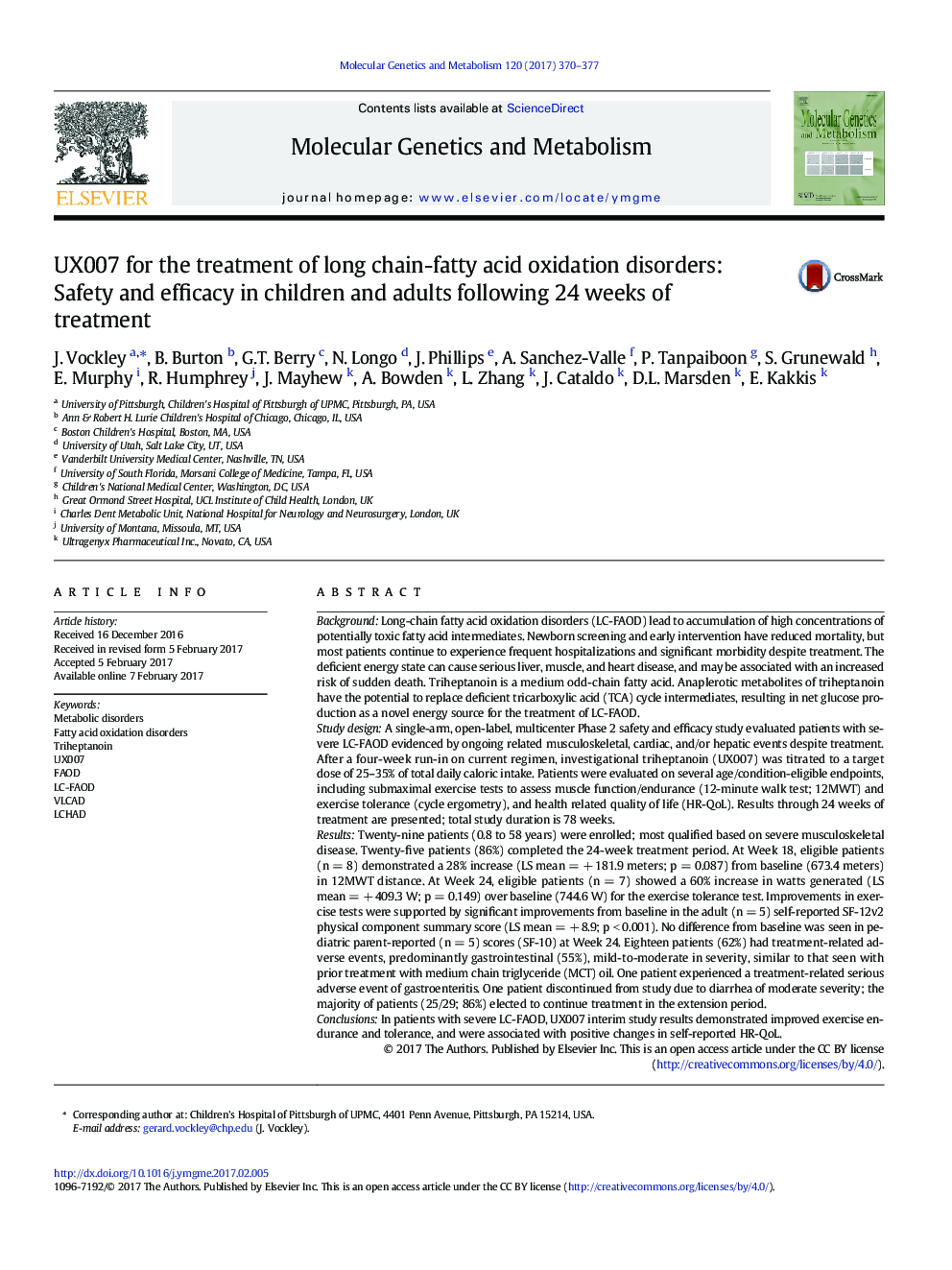| کد مقاله | کد نشریه | سال انتشار | مقاله انگلیسی | نسخه تمام متن |
|---|---|---|---|---|
| 5513949 | 1541555 | 2017 | 8 صفحه PDF | دانلود رایگان |

- Fatty acid oxidations (FAODs) are serious inborn errors of metabolism that are significant causes of morbidity and mortality.
- Dietary therapy has been only partially successful in preventing symptoms.
- We present 24Â week results of a Phase 2 clinical trial of the use of a novel therapy for FAODs, UX007.
- This medication improved exercise tolerance and wellbeing in patients.
BackgroundLong-chain fatty acid oxidation disorders (LC-FAOD) lead to accumulation of high concentrations of potentially toxic fatty acid intermediates. Newborn screening and early intervention have reduced mortality, but most patients continue to experience frequent hospitalizations and significant morbidity despite treatment. The deficient energy state can cause serious liver, muscle, and heart disease, and may be associated with an increased risk of sudden death. Triheptanoin is a medium odd-chain fatty acid. Anaplerotic metabolites of triheptanoin have the potential to replace deficient tricarboxylic acid (TCA) cycle intermediates, resulting in net glucose production as a novel energy source for the treatment of LC-FAOD.Study designA single-arm, open-label, multicenter Phase 2 safety and efficacy study evaluated patients with severe LC-FAOD evidenced by ongoing related musculoskeletal, cardiac, and/or hepatic events despite treatment. After a four-week run-in on current regimen, investigational triheptanoin (UX007) was titrated to a target dose of 25-35% of total daily caloric intake. Patients were evaluated on several age/condition-eligible endpoints, including submaximal exercise tests to assess muscle function/endurance (12-minute walk test; 12MWT) and exercise tolerance (cycle ergometry), and health related quality of life (HR-QoL). Results through 24 weeks of treatment are presented; total study duration is 78 weeks.ResultsTwenty-nine patients (0.8 to 58 years) were enrolled; most qualified based on severe musculoskeletal disease. Twenty-five patients (86%) completed the 24-week treatment period. At Week 18, eligible patients (n = 8) demonstrated a 28% increase (LS mean = + 181.9 meters; p = 0.087) from baseline (673.4 meters) in 12MWT distance. At Week 24, eligible patients (n = 7) showed a 60% increase in watts generated (LS mean = + 409.3 W; p = 0.149) over baseline (744.6 W) for the exercise tolerance test. Improvements in exercise tests were supported by significant improvements from baseline in the adult (n = 5) self-reported SF-12v2 physical component summary score (LS mean = + 8.9; p < 0.001). No difference from baseline was seen in pediatric parent-reported (n = 5) scores (SF-10) at Week 24. Eighteen patients (62%) had treatment-related adverse events, predominantly gastrointestinal (55%), mild-to-moderate in severity, similar to that seen with prior treatment with medium chain triglyceride (MCT) oil. One patient experienced a treatment-related serious adverse event of gastroenteritis. One patient discontinued from study due to diarrhea of moderate severity; the majority of patients (25/29; 86%) elected to continue treatment in the extension period.ConclusionsIn patients with severe LC-FAOD, UX007 interim study results demonstrated improved exercise endurance and tolerance, and were associated with positive changes in self-reported HR-QoL.
Journal: Molecular Genetics and Metabolism - Volume 120, Issue 4, April 2017, Pages 370-377